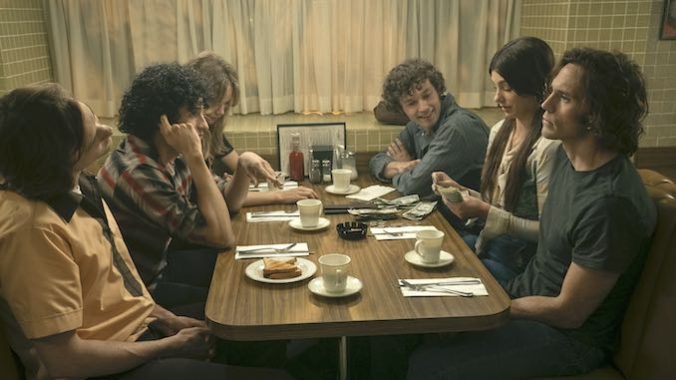In a Sea of Adapted Material, Daisy Jones & the Six Is Barely Treading Water
Photo Courtesy of Prime Video

As much as we might beg for something original to grace our TV screens, Hollywood will never let go of the security blanket that comes along with adapting established IP. A screenwriter might come up with a cool new idea about zombies or vampires or being an unhinged woman who experiences so much trauma that we all clap when she burns the world down, but if there’s someone else who has told a similar story through another medium, there’s no doubt that they will be a studio’s first choice. Preexisting IP generally comes with a well-established audience, which guarantees that people will tune in to the pilot of the series, and that’s a lot more cost-effective than taking a chance on a property with no strong cultural roots.
Daisy Jones & The Six is Prime Video’s latest imagining of a beloved piece of media. Author Taylor Jenkins Reid is a favorite with a large swath of readers on and offline, so it’s no surprise that the series was picked up before the book was released. Really though, the big draw comes from the titular band and their Fleetwood Mac-inspired music and drama.
While the content of the book is exactly what you would expect from something a step above fanfiction, its presentation as an oral history makes up for the otherwise predictable story. The interviews with the band members and their associated parties paint an impressionist picture of their rise and fall—sometimes everyone remembers what happened the same way and other times there are two or three different versions of the story. Readers get to decide who to trust and who to disregard throughout the story, and that element is ultimately what makes things fun. Unfortunately, that fun was the first thing to go when Daisy Jones & The Six was adapted to the screen.
Not every adaptation can be a powerhouse like The Last of Us or a true global sensation like Game of Thrones. Adaptations have a lot of important contributing factors pouring into them that make them as good as they are, and writers that understand when things need to be cut out of the story or changed are high on that list. TLOU and the early seasons of GoT are great at streamlining, but Daisy Jones & The Six catastrophically fails at it. There are certain things that don’t make complete sense in the book (mainly regarding record label and touring logistics), and as much as fans of the books love the lyrics to the songs on the Aurora album we get in the final pages, they’re more like poems than anything else. The Amazon-produced version of Aurora we received can’t touch any of Fleetwood Mac’s greatest hits, but it’s pretty good as companion soundtracks for TV go—and ultimately a change for the betterment of the series.
-

-

-

-

-

-

-

-

-

-

-

-

-

-

-

-

-

-

-

-

-

-

-

-

-

-

-

-

-

-

-

-

-

-

-

-

-

-

-

-








































